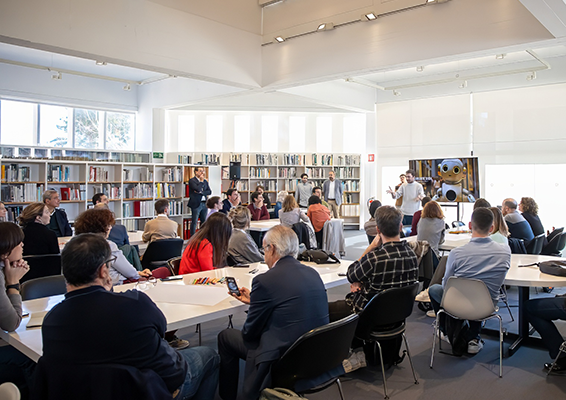Article 15
The governance and administration of the Foundation shall be the responsibility of the Board of Trustees, which is the representative body with all the powers necessary to pursue the founding aims.
Article 16
The Board of Trustees is a collegiate body which shall be made up of at least three members and at most eleven.
The trustees shall be persons appointed by the Board of Trustees for a period of 4 years; they may be re-elected for periods of the same duration.
The trustees may be removed by resolution of the Board of Trustees, voting with a qualified majority as specified in article 30 of these Articles of Association.
Trustees who cease to be trustees, for any reason, before completing their term of office, may be replaced by resolution of the Board of Trustees. The person designated as a replacement shall be appointed for the remainder of the term of office of the person being replaced. However, the replacement may be re-elected for a term of the same length as that established for other members of the Board of Trustees.
Appointments and re-elections shall both be carried out at the proposal of the Board of Directors of Banco de Sabadell, S.A., and removals subject to prior notification to the Board of Trustees.
Article 17
Members of the Board of Trustees shall begin their duties having expressly accepted the role.
Article 18
The trustees are not remunerated for simply carrying out their role, nevertheless, they do have the right to receive advance payment or reimbursement of their duly justified expenses and may receive compensation for damage arising as a result of the performance of their duties.
In any case, trustees who perform executive, managerial or administrative duties other than the duties and functions inherent to the role of trustee, may be remunerated for those activities under the framework of a contractual relationship, clearly stating the work or professional duties to be remunerated, which must be distinct from those carried out in the position of trustee. The number of trustees with an employment relationship must be less than the number of trustees required for the Board of Trustees to be deemed validly constituted.
Article 19
The Board of Trustees is empowered, among other things, to:
- Elect new trustees if the number of Board trustees is increased, and also to fill any vacancies that may arise for any reason, in line with the requirements established in these Articles of Association and in accordance with the provisions of the legislation in force.
- Re-elect and remove trustees.
- Create management and executive bodies, appoint persons to those bodies and grant them the corresponding powers.
- Perform the legal acts and business concerning the representation and governance of the foundation, and have free hand to manage and draw on all the assets that comprise the Foundation’s assets, income and proceeds, and to exercise all of its rights and entitlements, within the statutory and legal provisions.
- Approve the annual financial statements including the balance sheet, income statement and the annual report.
- Interpret these Articles of Association and establish any additional rules that may be appropriate, in accordance with the legislation in force, and settle all legal issues that may arise.
- Agree on the modification of the Articles of Association, or on the merger, dissolution or addition of another foundation; these acts cannot be performed without the approval of the Protectorate.
- Decide in relation to the development of the Foundation’s activities, approving action programmes and the application of income.
- Ensure the successful attainment of the founding aims and approve all rules considered necessary to achieve them, while interpreting the will of the Foundation’s founders.
- In general, perform all acts, participate in legal business and grant any contract that may be required for optimal administration and use of the Foundation’s revenue and assets, and for the exercise of the rights, actions and powers that may be appropriate to best achieve the founding aims.
Article 20
The Board of Trustees shall meet, mandatorily, at the Ordinary General Meeting in the first half of each calendar year.
It shall meet at Extraordinary Meetings as often as the Chairman considers appropriate, at its own initiative and, of necessity, when one quarter of the Board of Trustee’s members request a meeting.
Article 21
Meetings shall be convened by the Chairman, and the meeting notice shall contain the agenda setting out all matters that will be discussed at the meeting, outside of which no valid resolutions can be taken. The meetings may be held in any location where the Foundation carries out its social activities.
The meeting notice shall be distributed at least 7 days in advance of the meeting.
The Board of Trustees may meet via videoconference or using other communication means, provided that those attending can be securely identified, continuity of communication is ensured, and all those attending are able to take part in the discussions and cast their votes. In such a case, the meeting will be understood to be held in the place where the Chairman is located at that time.
Some resolutions may be adopted without a meeting, including the approval of the annual financial statements, by casting postal votes, via telematic communication or by other means, provided that reporting and voting rights are upheld, there is some form of proof of receipt of votes and the authenticity of votes can be guaranteed. In such a case, the resolution shall be understood to have been adopted at the Foundation’s head office and on the date of receipt of the last validly cast vote.
Article 22
The Ordinary General Meeting shall:
- Examine and, as applicable, approve the annual financial statements for the previous year, which the Board of Trustees shall draw up each year.
- Approve the annual report and determine the activities to be developed in the following year.
- Settle any other business on the meeting agenda.
Article 23
Extraordinary Meetings may adopt resolutions on all matters set forth in the meeting agenda.
Article 24
The Board of Trustees may designate, from among its members, a Chairman, one or more Vice-Chairmen and a Treasurer, who shall carry out their duties for a four-year term of office, in accordance with the provisions of Article 16.
A Secretary will also be appointed, who shall take part in meetings with entitlement to speak but, if they are not a trustee, without entitlement to vote.
If a Director of the Foundation has been appointed, they shall take part in meetings with entitlement to speak but, if they are not a trustee, without entitlement to vote.
Other trustees shall have entitlement to speak and vote.
Article 25
The Chairman of the Board of Trustees shall have the following powers, notwithstanding any others that may be expressly attributed to him:
- To represent the Foundation.
- To call Ordinary and Extraordinary Meetings, in accordance with these Articles of Association.
- To submit the annual financial statements for the previous year to the Ordinary General Meeting.
- To decide, with his casting vote, the outcome of tied votes.
- And all other powers specified in these Articles of Association.
Article 26
The General Manager, if any, shall be in charge of the Foundation’s ordinary management and shall have the following powers, notwithstanding any others that may be expressly attributed to him:
- To represent the Foundation in all kinds of acts.
- To represent the Foundation in and out of Court, except in cases where the Board of Trustees designates another special representative.
- And all other powers specified in these Articles of Association.
Article 27
Minutes will be drawn up for each meeting of the Board of Trustees. These will be authorised by the Secretary with the approval of the Chairman or, failing that, the approval of a Vice-Chairman. The Secretary shall also issue certification of the Chairman’s approval or, failing that, of a Vice-Chairman’s approval. These minutes will be approved by the Board of Trustees, either immediately following the opening of the relevant meeting or at the next meeting. However, resolutions are enforceable as soon as they are adopted, unless it is expressly provided, in the articles of association or when adopting the resolution, that they are not enforceable until the minutes are approved. If resolutions require mandatory registration, they shall be enforceable upon registration.
The Secretary shall draw up the minutes which will include a list of those attending each meeting, the form and outcome of each vote, and the verbatim text of the resolutions adopted at each meeting.
The Secretary shall sign the annual financial statements approved by the Board of Trustees with the approval of the Chairman.
Article 28
The Treasurer shall ensure that the amounts received by the Foundation are paid into a current account or passbook savings account.
He shall deposit securities, on behalf of the Foundation, in a bank.
Article 29
Except in cases where the Articles of Association require a special majority, the meetings of the Board of Trustees shall be validly constituted and may adopt valid resolutions when one fifth of its members (that is, at least two members) are present in person, provided the Chairman or a Vice-Chairman is present. If the Secretary is not present, his duties shall be carried out by one of the trustees, who shall be expressly designated by those attending.
Each trustee shall have one vote. Resolutions shall be adopted by simple majority of the votes cast.
The trustees must attend meetings of the Board of Trustees in person and under no circumstance may they be represented by a proxy, as the role is exercised on a strictly individual basis.
Legal persons must be represented at meetings of the Board of Trustees by an expressly authorised natural person. Nevertheless, a natural person who represents a public institution may delegate another natural person to represent it.
Article 30
A favourable vote of one half plus one of the Board of Trustees members shall be required for:
- The acts referred to in Article 13 of these Articles of Association.
- The removal of trustees.
- Modification of the Articles of Association, the merger with or addition of another foundation, or the spin-off, dissolution or wind-up of the Foundation. The adoption of these resolutions must also comply with the requirements set forth in Law 4/2008, of 24 April, of the third volume of the Civil Code of Catalonia relating to legal persons.
Article 31
The trustees and comparable persons, in accordance with article 312-9.3 of Law 4/2008, of 24 April, of the third volume of the Civil Code of Catalonia relating to legal persons, may only carry out operations with the Foundation if it can be clearly demonstrated that they are necessary and that the interests of the Foundation prevail over the particular interests of the trustee or comparable person.

